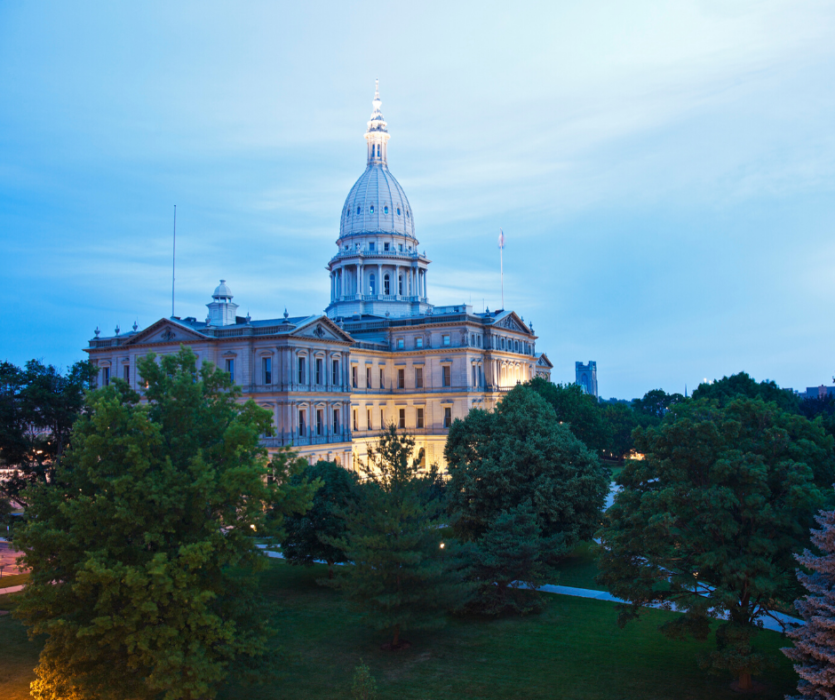
If Gov. Gretchen Whitmer’s Michigan Department of Health and Human Services is going to turn up the dial on further restrictions in the face of a “third surge” of COVID-19 cases, they’re not letting on to the fact.
The governor never mentioned lower capacity limits in restaurants or statewide moves back to remote learning Wednesday morning on CNN in a rare recent interview she’s done on this subject.
She argued that Michigan went through some of the nation’s tougher restrictions when vaccines were not widely available, and Michigan saw low infection and death rates than other states.
Now that many of the restrictions have loosened, the case numbers are admittedly climbing. The difference is the vulnerable populations have been — by and large — vaccinated, and many people are in the process of getting a shot if they haven’t received it already.
Vaccinations are now hitting 100,000 a day in Michigan, with 4.2 million doses given to date, the governor’s office announced Wednesday.
Still, Michigan’s seven-day case rate per 100,000 people is at 361.5, the highest in the nation, according to the Centers for Disease Control.
In speaking to CNN, the governor noted that the rise in Michigan’s cases needs to be kept in perspective. Some states with infection rates in the double digits in January may now be down slightly but still be fairly high.
She credited the tighter restrictions for keeping the numbers low when not as many people were vaccinated.
“You do see 50% increases from 3% to 6%, but still 3% was still a lot lower than a lot of the rest of the country when other states go from 15% to 14%, it looks like they’ve got a great positive trend, so I think perspective is really important,” she said.
According to CDC statistics, compared to five other states of similar size, Michigan’s daily case numbers were notably lower for about 70 days earlier this year.
While Michigan had a seven-day average of 2,747 new cases in mid-January, New Jersey, Ohio, North Carolina, Virginia, and Pennsylvania all had seven-day averages of between 4,000 and 7,000.
Also, during that time period, Michigan’s death numbers were below the other states, except for Virginia, which doesn’t appear to have been regularly keeping up reporting their deaths given their erratic reporting numbers.
Asked by the CNN anchor if it was a “mistake” to roll back the restrictions to the degree they did, Whitmer pointed out Michigan didn’t have vaccines when the fall restrictions began. There are three now.
“We’ve got a high proportion of variants, and that means coronavirus spreads faster,” she said. “They are more contagious, and we’re seeing that, whether it is youth sports, or it is the re-engagement of some of our restaurants, etc. More activity means more spread.”
The comments would seem to flip the script on legislative Republicans’ stance of linking restrictions on restaurants, schools, and other sectors of life to hard numbers.
For example, under SB 0250, which the Senate passed last week, restaurants could only be allowed to be at 25% capacity given that Michigan’s infection rate is 13%. The current limitations are at 50% capacity.
Senate Republican spokesperson Abigail Walls said the bill is designed to provide the hospitality industry with some certainty on what metrics would trigger restrictions.
“That’s what following the science to protect lives would be,” Walls said. “We, and many others along with us, have been asking for metrics for a year now, and none have been provided.”
Asked if that meant the Republicans are for restrictions, given the case numbers, Walls responded that the particulars could be adjusted. Still, the fact remains that the governor has not put forward hard numbers attached to her policy decisions.
She makes vague references to various pieces of data but doesn’t elaborate on the combinations.
The fluid dynamic drove Sen. Aric Nesbitt (R-Lawton) to tweet late Tuesday night, “She says she has been using science and data the whole time . . . or . . . has she actually been using political science and polling data?”